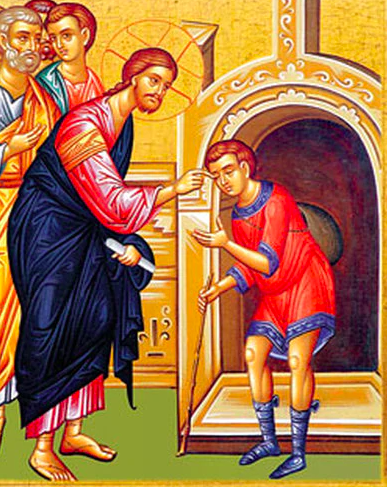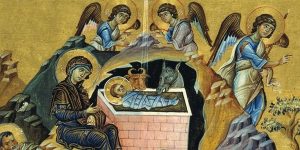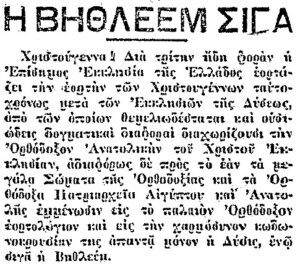Sermon on the 34th Sunday after Pentecost, 2021 His Eminence, Archbishop Tikhon of Omsk and Siberia First Hierarch of the Russian True Orthodox Church – Unofficial Translation

Novosibirsk, Siberia
And it came to pass, that as He was come nigh unto Jericho, a certain blind man sat by the wayside begging: And hearing the multitude pass by, he asked what it meant. And they told him, that Jesus of Nazareth passeth by. And he cried, saying, Jesus, thou son of David, have mercy on me. And they which went before rebuked him, that he should hold his peace: but he cried so much the more, Thou son of David, have mercy on me. And Jesus stood, and commanded him to be brought unto Him: and when he was come near, He asked him, saying, What wilt thou that I shall do unto thee? And he said, Lord, that I may receive my sight. And Jesus said unto him, Receive thy sight: thy faith hath saved thee. And immediately he received his sight, and followed Him, glorifying God: and all the people, when they saw it, gave praise unto God. (Luke 18:35-43)
In the name of the Father and of the Son and of the Holy Spirit.
In the life of Jesus Christ, many events occurred as if by chance, but in fact, every detail was done according to the plan of God’s Providence for the salvation of men. Today’s Gospel gives us an example of such a supposedly accidental event. A blind man was sitting by the roadside, as if by chance. And as if by chance Jesus Christ was passing by on the road. In reality, it was all according to the Providence of God. The Lord had to open the bodily eyes of this wretched blind man only a few days before the spiritually blind would crucify Him on the Cross in Jerusalem. He wanted to shame the unbelief of the elders and scribes of Jerusalem with the faith of this blind man. Those who looked into the Scriptures with their eyes every day in the temple and interpreted them to the people could not see the Messiah and Savior in the Lord Jesus Christ. But this blind man of Jericho, who could neither read the Scriptures nor interpret them, saw in Christ the Lord and Savior of the world.
This blind man, named Bartimaeus, was not only blind but also a beggar, sitting by the roadside, asking for alms. He already knew our Lord Jesus Christ, not only by His name but also by His works. He knew that many of his fellow blind men had been healed by Christ. So, he had long wished for this One Healer to pass by him on the road, and when he was told that Jesus of Nazareth was coming, he cried out: “Jesus, Son of David, have mercy on me!” And though he was forced to be silent, he shouted even louder: “Son of David, have mercy on me!” He knew that his hour of destiny had arrived: either he will be healed, or he will remain by the road to his death, surrounded by an impenetrable night for the rest of his life. A wonderful example of firmness and steadfastness of faith is given to us by the blind man Bartimaeus. He is forced into silence, but he pays no attention to it.
Finally, as they approached, the Lord heard the cries of the blind Bartimaeus. Jesus stopped and told him to bring him to Himself. And when he came to Him, He asked him: “What dost thou wish that I should do to thee?” He said: “Lord, that I might recover my sight.” The Lord asks not only for the sake of the blind man himself, that he might use words to reveal the feelings of his heart, but also for the sake of the people present, that they might hear that the blind man Bartimaeus does not ask Him for alms in the form of pennies, but asks for the alms that only God can give him. Then Jesus said to him, “Recover thy sight; thy faith hath made thee well.” And Bartimaeus saw right away and followed Jesus, praising God.
Let us note that after his sight was miraculously healed, the blind man’s eye was first fixed on the Immortal Jesus, the One who is stronger than all the world, stronger than death, stronger than all the powers of hell. Having seen the Living Christ, he now knows what his tongue is for – to praise God. The blind Bartimaeus did not use his eyes for the destruction of his soul, but to contemplate the greatness and glory of God, for which, in fact, they are given to man by God. This miraculous healing of Bartimaeus’ blindness served to convert many witnesses of this miracle who were themselves blinded by doubt and unbelief. Their spiritual eyes opened, and they began to praise God.
In the words of the Holy Fathers, the world around us is a huge hospital. And the greatest number of patients in this hospital are blind people. And the only Physician in this hospital is our Lord Jesus Christ. Today, the number of physically blind people is exceptionally small compared to the huge number of spiritually blind people.
It is especially terrible and devastating when spiritual blindness affects those who are placed in charge of others. It is of such that Christ the Savior said: “They are blind guides of the blind. And if the blind guide the blind, both shall fall into a pit.” (Matthew 15:14.)
The Venerable Seraphim of Sarov spoke of those who are responsible for the spiritual guidance of others: “Before the reasoning of good and evil, man is not able to feed verbal sheep, but only dumb ones, because without the knowledge of good and evil we cannot comprehend the actions of the evil one.” This must be especially remembered by those who presume to teach, mentor, and guide others. The spiritual blindness of modern church hierarchs in many local churches deprives them of the opportunity to see the rapid onset of the apocalyptic period of life on earth. Unfortunately, many of them themselves, without any coercion, consciously and actively participate in the building of the New World Order. This is an example of the terrible spiritual blindness that contributes to the approaching end of world history.
There is blindness of all kinds in human nature, which is a consequence of prideful arrogance, power, and vanity. But there is also moral blindness, blindness of the heart – this is dislike and hatred of one’s neighbor. The Holy Apostle John the Theologian says, “the one hating his brother is in darkness, and walketh in the darkness, and knoweth not where he goeth, because the darkness blinded his eyes.” This terrible blindness is characteristic of many people – one hates his own kind, his brother or sister in Christ, a member of the Church of Christ, subject, like himself, to sinful weakness.
In our daily lives, we quickly become accustomed to placing responsibility for our actions on other people, and we are very good at it. But as we put the responsibility for our sins on others, we are less and less likely to notice them in ourselves over time, as if we were blind to our own sins. But when we become completely blind to our sins and find an excuse for them, we begin to see only all kinds of vices in others, and we become unable to find even a little bit of good in those around us, we lose our goodwill and love for our neighbor. This is the blindness we need to fear more than anything else, for if we lose our love for our neighbor, we cannot love God.
There are also other times, when a person with all his soul striving for God, does good deeds, but, strangely enough, instead of gratitude for his good deeds is ridiculed by the people around him. At first, he tolerates these taunts, but there comes a point when, unable to tolerate what is happening, one falls into the sin of pride and condemnation of his abusers. This is an example of another blindness of man when he does not notice that his abusers are in servitude to the dark forces.
Let us remember that when our Lord Jesus Christ came from Jericho to Jerusalem, he was killed by spiritually blind men – Herod, Pilate, Caiaphas, and a blind mob of elders and scribes. But the grave, barely holding Him for three days, had to let Him go. The Lord has risen and is alive and is now residing in His Church, invisible to bodily eyes but visible to the spiritual eye. And He is ready to have mercy on everyone if only one calls out to Him. And anyone who has received spiritual sight from Him will follow him and praise God. To him who has seen the Lord, nothing worldly is of interest anymore; it loses all attraction and value to him.
The only kind of blindness that can be tolerated for us is when we become blind to the wrongs done to us for our good works, blind to the faults and sins of others, and blind to the vainglory of this world. If we are equally oblivious to all these things, then we can gain the spiritual vision that can establish us on the path of our salvation.
The blind man, Bartimaeus, who saw clearly, showed the good fruits of his fervent faith and the thoughts of his grateful heart by following in the footsteps of Jesus Christ and praising God.
Let us also imitate this blind man, always giving thanks and praising our Savior, who showed us the light. Bestow, O Lord, Thy mercy upon us, as we trust in Thee, that we may not be ashamed forever.
AMEN







